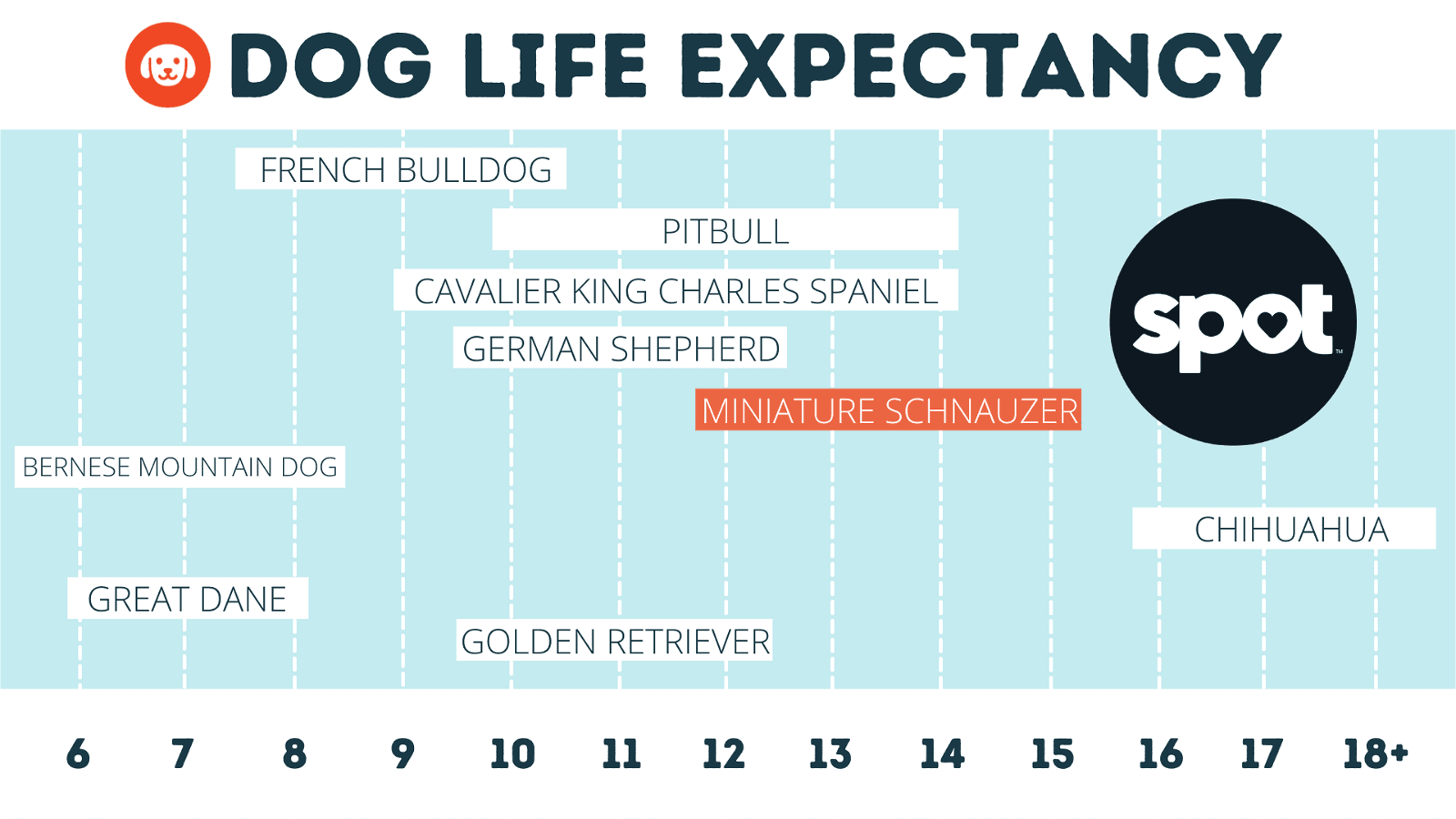Although they are the smallest of the three Schnauzer breeds, the Miniature Schnauzer makes up for it with an outgoing, friendly personality sure to charm those around him. These smart, distinguished dogs are blessed with sporty good looks and a compact size that makes them great for any home, big or small. As a purebred dog breed, however, they are more prone to genetic health problems.
Today, we’re breaking down the most common Miniature Schnauzer health problems so that you can carefully monitor your Miniature Schnauzer with your veterinarian’s help.
Common Mini Schnauzer Health Problems
Listed below are the five most common Mini Schnauzer health concerns.
diabetes
liver problems
hemorrhagic gastroenteritis
bladder or kidney stones
skin allergies and skin diseases
#1 Diabetes
Diabetes is a common disease among many dogs, but Miniature Schnauzers are affected at an even higher rate. When a dog becomes diabetic, they are unable to regulate and process sugars in their body. Frequently, they will require daily injections of insulin to manage this condition.
Along with managing your dog’s diabetes, diabetes also puts your pup at a higher rate of other serious issues, like cataracts. Cataracts obscure their vision and can even cause partial or full blindness in the affected eye. Studies estimate that 80% of dogs will develop at least one cataract within 16 months of a diabetes diagnosis.
Symptoms of diabetes in Miniature Schnauzers:
excessive drinking
frequent urination
cloudy eyes
increased or decreased appetite
coat shedding excessively
#2 Liver Problems
Not to be confused with liver-colored Schnauzers, Miniature Schnauzers are more prone to liver problems, especially portosystemic shunt (PSS). PSS occurs when blood meant to go to the liver instead goes around the liver, depriving the liver of the necessary blood to function correctly. When the liver is unable to function properly, your dog cannot remove toxins from their bloodstream effectively.
The liver of Miniature Schnauzers are very sensitive. Your veterinarian can regularly screen for PSS with a liver function test. Surgery is often needed, but some dogs may be treated with only medication and a special diet. The special diet will likely be protein-reduced which is necessary for improving liver function for at least six to eight weeks.
Symptoms of PSS in Mini Schnauzers:
stunted growth
abnormal behaviors
seizures
weak muscle development
#3 Hemorrhagic Gastroenteritis
Hemorrhagic Gastroenteritis (HGE), also known as acute hemorrhagic diarrhea syndrome, occurs when vomiting and bloody diarrhea occur in dogs. HGE often happens in dogs that otherwise appear healthy, and toy dog breeds, such as Mini Schnauzers, are affected the most.
The exact cause of HGE has not yet been determined. Still, it can be treated with intravenous fluid therapy that supplies the dog with plenty of electrolytes and potassium, as well as antibiotics to counter the potential for a secondary intestinal infection. If untreated, a dog will become severely ill and may even die.
Since the cause of HGE is unknown, there is no way to scan for it. If your Miniature Schnauzer has any of the above symptoms, immediately reach out to your veterinarian.
Signs and symptoms of HGE:
vomiting
bloody diarrhea
tiredness
dehydration
fatigue
#4 Bladder or kidney stones
Miniature Schnauzers are more prone to developing bladder and kidney stones, particularly calcium stones, than other dogs for unknown reasons. Female Miniature Schnauzers or Mini Schnauzers over the age of six are at an even higher risk of developing this painful condition.
To prevent this, many veterinarians will periodically test your Miniature Schnauzer’s urine for any signs of kidney or bladder stones. It’s great pet care to get your Schnauzer’s urinary tract checked often for bladder or kidney stones, plus other potential urinary tract infections.
If you notice that your furry friend has blood in their urine, is straining to urinate, or cannot urinate, immediately contact your veterinarian. Bladder and kidney stones are incredibly painful!
Signs of bladder infections or kidney stones:
blood in urine
frequent urination (even if little comes out)
poor appetite
vomiting
kidney pain
abdominal discomfort
#5 Skin allergies and skin diseases
When humans develop environmental allergies, we typically experience an increase in sneezing, itchy eyes, and a runny nose. However, dogs with environmental allergies will develop itchy skin, otherwise known as “atopy.” The most sensitive areas of their skin include their ears, skin folds, belly, and feet.
If you notice that your Miniature Schnauzer is suddenly rubbing their face more, licking their paws, and has regular ear discomfort or ear infections, they may have allergies. There are a wide variety of available allergy treatments to relieve your pup’s discomfort. Consult with your veterinarian to discuss your treatment options.
Miniature Schnauzers are also prone to follicular dermatitis, also known as Schnauzer bumps. Schnauzer bumps are not a life-threatening condition, but they can be very uncomfortable for your dog. Schnauzer bumps are often described as “canine blackheads,” and they occur when bacteria infects your Schnauzer’s hair follicles.
If scratched or opened, these bumps can quickly become infected. As a Mini Schnauzer parent, it’s vital that you keep an eye on your pet’s skin for any bumps and signs of infection.
Signs of skin infections and allergies in dogs:
frequent or excessive itching
skin redness
chewing or biting at skin
lesions, hot spots, or open sores
sneezing or runny nose
Mini Schnauzer Health Outlook
Even with Mini Schnauzers health issues, these small dogs are great, low-shedding companions for your family. According to the breed standard, Mini Schnauzers live to be 12 to 15-years old. In comparison, Standard Schnauzers live on average to be 13 to 16-years old.
Whether you have a black, silver, salt & pepper, or white Miniature Schnauzer, these energetic dogs will certainly bring happiness into your home.


As Spot’s resident cat enthusiast, I am dedicated to researching and sharing information that helps pet owners take the best care of their pets. Pet ownership comes with it’s share of challenges, but my goal is to help make this journey easier.












